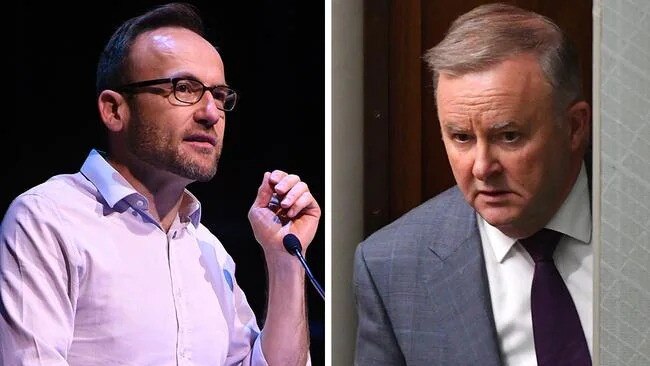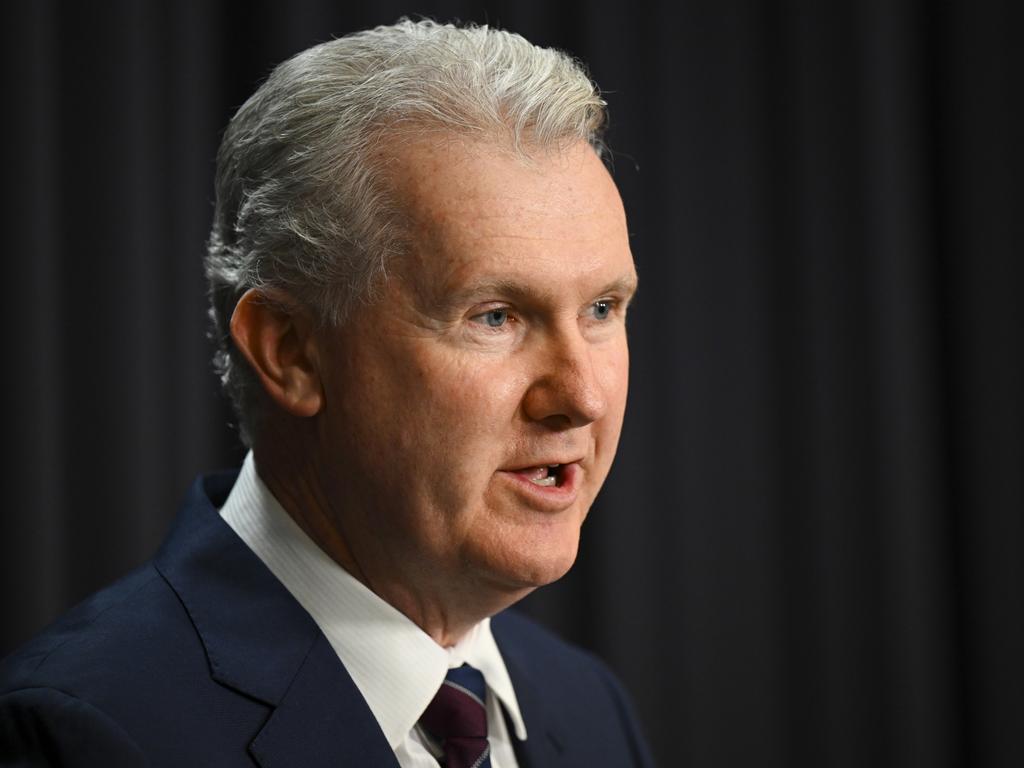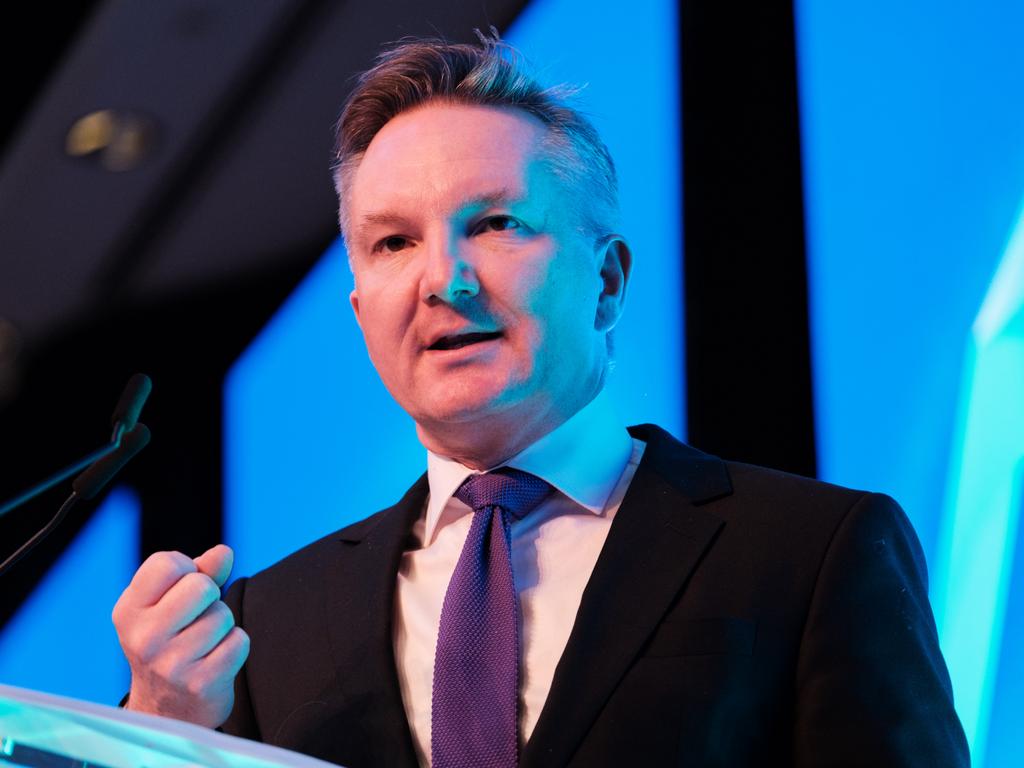Labor open to deeper emissions cuts in Greens deal
The Albanese government and the Greens are inching closer to a deal on a 43 per cent emissions reduction target by 2030.

Labor and the Greens are inching closer to a deal on a 43 per cent emissions reduction target by 2030, with Energy Minister Chris Bowen open to exceeding the benchmark and considering more ambitious outcomes.
Mr Bowen said Labor had a mandate to enshrine in law its climate change agenda but it was open to more ambitious outcomes.
“The bill makes it clear that 43 per cent is our minimum commitment and does not prevent our collective efforts delivering even stronger reductions over the coming decade,” Mr Bowen said.
“The government is giving the parliament the opportunity to end the climate wars. The bill … provides a platform for collaboration to drive down emissions while ensuring reliable energy supplies.”
The Australian understands that Greens leader Adam Bandt, who has been in contact with Mr Bowen about the climate change bill since the May 21 election, is moving closer to a compromise with Labor to avoid a re-run of the climate wars.
With the Coalition opposing legislated climate change targets, Labor needs the support of the Greens and one crossbench senator to push through the climate change bill. Moderate Liberal MPs have also threatened to cross the floor and support the 43 per cent target.
The climate change clash, worsening inflation and Jim Chalmers’ economic update containing fresh Treasury forecasts will dominate the first sitting fortnight of the 47th parliament, which opens on Tuesday and will see the government introduce 17 other new pieces of legislation.
The climate change bill will give the Climate Change Authority greater powers to advise on adjusting emission reduction targets and prepare a new 2035 objective under the Paris Agreement.
New details of Labor’s climate change bill reveal the 2030 target and net zero emissions by 2050 commitment, which don’t require legislation, will be embedded across key government bodies including Infrastructure Australia, Northern Australia Infrastructure Facility, Export Finance Australia and other clean energy agencies.
The legislation also requires the Climate Change Minister to report annually to parliament on progress in meeting targets.
With formal face-to-face negotiations between Mr Bowen and Mr Bandt beginning this week, senior Greens sources told The Australian they needed concessions from Labor before providing conditional support.
While Labor’s target falls short of the party’s 75 per cent emissions reduction cut by 2030, the Greens are open to passing the bill if it provides certainty around increasing targets via regulation and climate triggers for major emitting projects. The teal independents are also pushing for a ministerial regulation setting higher targets to avoid future stoushes in parliament.
The Greens partyroom, which will make the final decision on any deal, is expected to put forward amendments when the legislation arrives in the Senate. But Mr Bowen has resisted demands from Mr Bandt to ban coal and gas projects, introduce a climate change trigger for projects and adopt a ratchet mechanism, which would allow the minister to increase targets without being forced to take legislation to parliament.
Mr Bowen said the legislation was based on an “ambitious but realistic” baseline commitment.
Anthony Albanese and Peter Dutton on Monday convened partyroom meetings and attended a Last Post event at the Australian War Memorial ahead of MPs and senators returning to parliament for Tuesday’s official opening.
The Australian understands the government will allow the new “teal independents” to deliver their maiden speeches ahead of debate commencing on the climate change bill, which will be put into parliament on Wednesday.
In his speech to the Labor caucus, the Prime Minister told his 103 MPs and senators to “never take for granted” the privilege of government and to “make the people who have sent us here collectively proud each and every day”.
The Albanese government, which intends to push the climate change bill through the House of Representatives next week, is expecting a final Senate vote on the legislation in September. The bill could also be referred by the Greens to a Senate inquiry.
With the Greens holding 12 Senate and four lower house seats, Mr Bandt on Monday said Labor’s target was “very weak” and would not ensure global warming was kept below 1.5C. Signalling that he would adopt a “good faith” approach to negotiations with Mr Bowen, Mr Bandt said his preference was to “improve and pass” the legislation if the target had “teeth” and could not be reversed by future governments.
Mr Bandt, who has authority from his partyroom to lead negotiations with Labor, said the Greens had been given a clear election mandate from voters.
“We’ve got a number of issues with the bill that has been released. The target is very weak. The target means the Great Barrier Reef will keep bleaching, crops will fail and we will see worse fires and floods,” Mr Bandt said.
“(The target) can’t be a ceiling. You can’t put in place obstacles for governments in the future that might be more climate ambitious to lift the target. We don’t want Pauline Hanson and Clive Palmer to be able to put a handbrake on future governments listening to the science and lifting the target. The legislation doesn’t compel the government to do anything. We want to know what teeth it will have.”
Mr Albanese told Labor MPs that “climate change is a national security issue” and that Australia must take it seriously to protect trade and economic relationships with key partners.
“We have already submitted our nationally determined contribution – our changed climate change target – to the United Nations Framework Convention on Climate Change of 43 per cent, consistent with what we took to the election,” Mr Albanese said.
“That has meant we have been able to walk through the door of international discussions, not just about climate but about trade and economic relationships, about our social relationships.
“Climate change is a national security issue. That is well understood throughout the world, but nowhere more so than with our Pacific neighbours.”








To join the conversation, please log in. Don't have an account? Register
Join the conversation, you are commenting as Logout